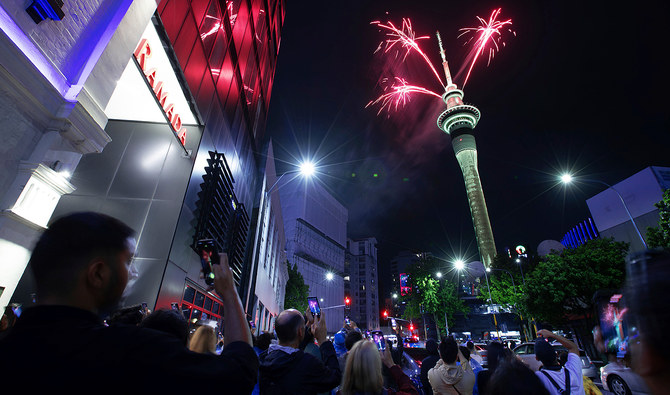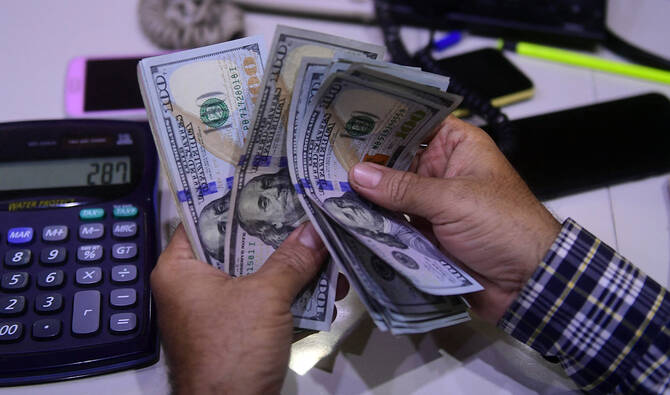Sydney and Auckland were among the world’s first major cities to ring in 2024, with revelers cheering spectacular fireworks displays that lit up the skies over Sydney Harbor and New Zealand’s tallest structure, Sky Tower.
As the clock struck midnight in Australia, tons of explosives erupted in a 12-minute display that focused on the Sydney Harbor Bridge. More than 1 million people — a number equivalent to one in five of the city’s residents — watched from the shore and from boats in the harbor.
“It’s total madness,” said German tourist Janna Thomas, who had waited in line since 7:30 a.m. to secure a prime waterfront location in the Sydney Botanic Garden. “It’s not so easy to find a good place to sit, but the view is incredible.”
In Auckland, the light rain that fell all day had cleared as forecast by midnight over the city of 1.7 million people before the countdown began on an illuminated digital display near the top of the 328-meter (1,076-foot) communications and observation tower.
The ongoing wars in Ukraine and Gaza, and heightened tensions in parts of the world, are affecting this year’s New Year’s Eve celebrations in a myriad of ways. Many cities were deploying extra security, and some places canceled New Year’s Eve events altogether.
More police than ever were deployed throughout Sydney. The waterfront has been the scene of heated pro-Palestinian protests after the sails of the Sydney Opera House were illuminated in the colors of the Israeli flag in response to the Oct. 7 attack by Palestinian militant group Hamas that triggered the war.

The "family fireworks", displayed three hours before midnight every year ahead of the main show at midnight, fill the sky over the Opera House (L) and Sydney Harbour Bridge (R) in Sydney on New Year's Eve on December 31, 2023. (AFP)
At the Vatican, Pope Francis recalled 2023 as a year marked by wartime suffering. During his traditional Sunday blessing from a window overlooking St. Peter’s Square, he offered prayers for “the tormented Ukrainian people and the Palestinian and Israeli populations, the Sudanese people and many others.”
“At the end of the year, we will have the courage to ask ourselves how many human lives have been shattered by armed conflict, how many dead and how much destruction, how much suffering, how much poverty,” the pontiff said. “Whoever has interest in these conflicts, listen to the voice of conscience.”
In Japan, temple bells rang out across the nation as people gathered at shrines and temples to welcome in the new year. At the Tsukiji Temple in Tokyo, visitors were given free hot milk and corn soup as they stood in line to strike a big bell, and a pipe-organ concert was held before a majestic altar.
In New York City, officials and party organizers said they were prepared to ensure the safety of tens of thousands of revelers expected to flood Times Square in the heart of midtown Manhattan.
Mayor Eric Adams said there were “no specific threats” to the annual New Year’s Eve bash, which was set to feature live performances from Flo Rida, Megan Thee Stallion and LL Cool J, as well as televised appearances from Cardi B and others. Organizers said in-person attendance was expected to return to pre-COVID levels, even as foot traffic around Times Square remains down slightly since the pandemic.
Amid near-daily protests sparked by the Israel-Hamas war in Gaza, New York City police said they would expand the security perimeter around the party, creating a “buffer zone” that would allow them to head off potential demonstrations.
Officials also planned to monitor any protests with drones, the mayor said.
“We will be out here with our canines, on horseback, our helicopters, our boats,” Adams said. “But as we saw last year, after having no specific threats, we get a threat.”
During last year’s New Year’s Eve party, a machete-wielding man attacked three police officers a few blocks from Times Square.
Security also will also be heightened across European cities on Sunday.
In France, 90,000 law enforcement officers were set to be deployed, domestic intelligence chief Céline Berthon said Friday.
Of those, 6,000 will be in Paris, where French Interior Minister Gerald Darmanin said over 1.5 million people are expected to attend celebrations on the Champs-Elysees.
Darmanin cited a “very high terrorist threat” partly because of the Israel-Hamas war. Police for the first time will be able to use drones as part of security work, he said, and tens of thousands of firefighters and 5,000 soldiers would also be deployed.
New Year’s Eve celebrations in the French capital will center on the 2024 Paris Olympic Games, including DJ sets, fireworks and video projections on the Arc de Triomphe, highlighting “changes in the city and faces of the Games,” according to the press service of the City of Paris. Other planned events include “the largest Mexican wave ever performed” and a “giant karaoke.”
The security challenge ahead of the Olympics was highlighted when a tourist was killed in a knife attack near the Eiffel Tower on Dec. 2. Large-scale attacks — such as that at the Bataclan in 2015, when Islamic extremists invaded the music hall and shot up cafe terraces, killing 130 people — also loom large.
In Berlin, some 4,500 police officers are expected to keep order and avoid riots like a year ago. Police in the German capital issued a ban on the traditional use of fire crackers for several streets across the city. They also banned a pro-Palestinian protest in the Neukoelln neighborhood of the city, which has seen several pro-Palestinian riots since the Oct. 7 attack by Hamas.
In Russia, the country’s military actions in Ukraine have overshadowed end-of-year celebrations, with the usual fireworks and concert on Moscow’s Red Square canceled, as last year.
After shelling in the center of the Russian border city of Belgorod Saturday killed 24 people, some local authorities across Russia also canceled their usual firework displays, including in Vladivostok. Millions throughout Russia are expected to tune into Russian President Vladimir Putin’s New Year’s address.
In Muslim-majority Pakistan, the government has banned all New Year’s Eve celebrations as an act of solidarity with the Palestinians.
In an overnight televised message, caretaker Prime Minister Anwaar-ul-Haq Kakar urged Pakistanis to “show solidarity with the oppressed people of Gaza” by beginning the new year with simplicity.
Kakar said Muslims across the world were saddened over Israel’s attacks on Gaza that resulted in the killings of thousands of innocent people.












